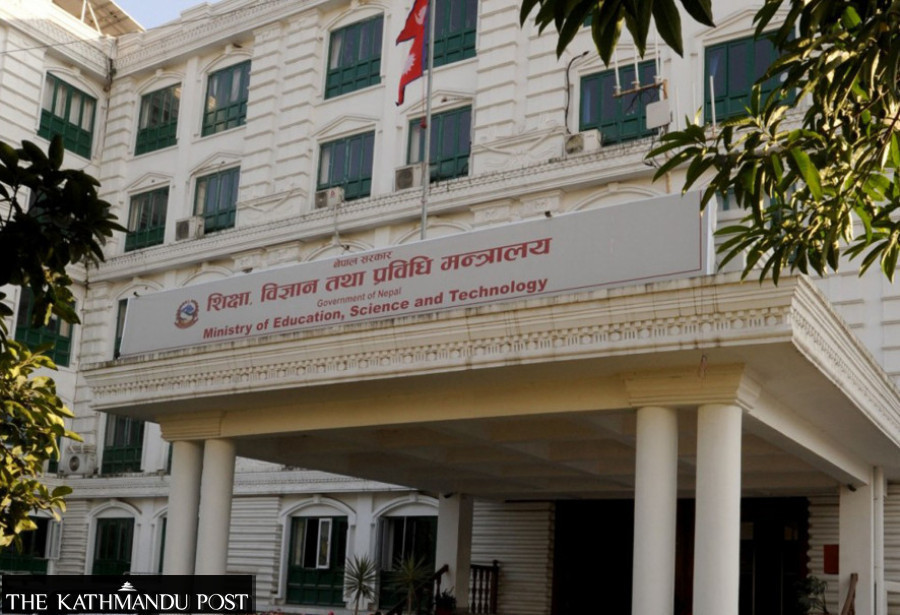Money
Education budget sees no departure
The allocation is just 10.75 percent of the national budget, smaller than this year’s pie.
Post Report
The share of the education sector decreased in the national budget for the upcoming fiscal year as the government chose to largely repeat the previous programme with minimal focus on improving quality.
Of the Rs1.964 trillion budget, Rs211.17 billion, the highest among all the ministries, has been spared for the Ministry of Education, Science and Technology. However, it is just 10.75 percent of the national budget, lower than the allocation for the current fiscal year.
The education sector received Rs203.66 billion in the ongoing fiscal year, which is 10.94 percent of the total budget. On various global platforms, Nepal has committed to allocate 20 percent of the national budget to the education sector.
The country has a shortage of thousands of teachers mainly for English, Science, and Mathematics. Through the budget, the government has announced to create ‘a teacher bank’ in collaboration with the universities to mobilise graduate-level students as volunteer teachers. Though the ‘teacher bank’ is a new concept, several preceding governments had tried and failed in mobilising university graduates for the schools.
“An umbrella Act for higher education will be introduced to maintain uniformity in university operations,” announced Bishnu Paudel, the finance minister, during his budget presentation to the joint session of the federal parliament on Thursday. The umbrella Act has been in talks for at least 15 years and has found place in the national budget and the policies and programmes almost every year. But it is yet to materialise.
Implementing academic calendars in the universities is another plan that is prioritised in every budget but is seldom implemented. There are instances of Tribhuvan University taking 40 months to publish examination results, as per this year’s auditor general’s report.
In the budget, the government has decided to provide a grant of Rs2.5 million per school to develop a model school in each district. The schools receiving such grants will assist in improving the quality of education in 100 other schools within their respective areas.
“A performance-based incentive programme will be implemented in 100 schools, with the inclusion of at least one school in each district,” said Paudel during his budget speech. “Such schools will be made responsible for supporting the improvement of results in other schools.” The government has been implementing a similar ‘model school’ programme for decades now.
The mid-day meal scheme, which has received Rs10.19 billion, too is an old programme. However, as per Paudel, its coverage has been expanded with a plan to benefit 2.8 million students. As much as Rs1.29 billion has been allocated to continue the free sanitary pad distribution programme in schools, which will benefit 1.3 million girl students.
“Scholarships currently being provided to students from targeted communities and remote Himalayan districts will be continued. Incentive scholarships will be offered to students from the Musahar, Dom, and Chamar communities for pursuing higher education in medicine,” the minister announced. This intervention is also not new.
The government has announced that the remuneration of the Early Childhood Development (ECD) assistants and school staff working in community schools has been increased. Rs10.16 billion has been allocated for it. But the amount of the increment has yet to be revealed. Increment of the remuneration of the ECD facilitators and the school staff was one of nine-agreements the government had signed with Nepal Teachers’ Federation.
Speaking at the event to sign the agreement, Education Minister Raghuji Pant had said Rs8 billion would be needed to implement those agreements. However, the total increment in the education budget compared to last year is just Rs7.51 billion including the money needed to pay the increased inflation allowance.
Expansion of the virtual teaching system to improve the quality of education, development of digital learning portal, hostel facilities to help students with disabilities to complete basic education are the other programmes reiterated for the upcoming fiscal year.
Under the National Education Reform Programme, capital grants will be provided for physical infrastructure development in schools with more than 1,500 students in the Tarai-Madhesh region, 1,000 in the hills, and 500 in the Mountain region, as per the budget. The construction of model schools currently underway will be completed, with Rs2.72 billion set aside for this purpose.
“Policies will be adopted to attract foreign students to universities. Free visas will be provided for the duration of the academic calendar, and multiple-entry visas will be arranged for their guardians,” said Paudel.
As per the budget, students who have completed school education will be encouraged to pursue technical/vocational or university education based on their results. Youths who are unable to pursue higher education will be made entrepreneurial through skill-based training, it further says.
“Each province will select one technical school to be upgraded into a model school. Students from technical streams in regular schools will be allowed to use the infrastructure of such model institutions for skill development,” according to the budget. It is also a continuation from previous years.




 10.97°C Kathmandu
10.97°C Kathmandu














